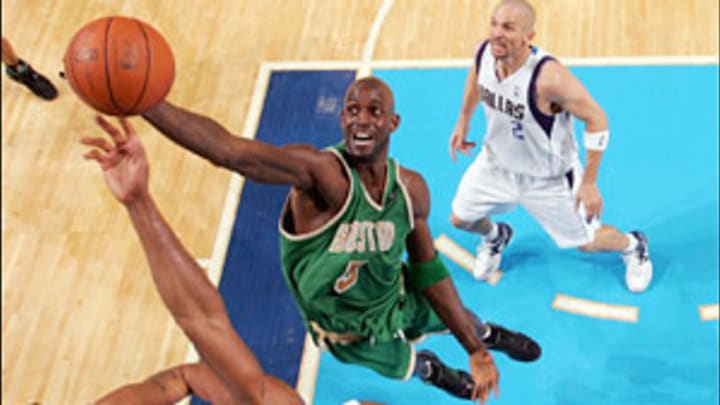Deep impact

Kobe Bryant, Kevin Garnett, LeBron James or Chris Paul will most likely win the NBA's Most Valuable Player award this season. The obvious question, however, is what makes any one of them more valuable than another?
The answer is a simple one. It's all in the eye of the voter.
You see, first and foremost, the MVP race is a popularity contest, plain and simple. It is 100 percent subjective with absolutely no guidelines passed on from above.
What makes it so difficult to pick an MVP this season is that there is no clear-cut, runaway leader. No one has distanced himself from the pack. When Steve Nash won the first of his two awards in 2005, for instance, he distinguished himself early by leading the highest-scoring, most exciting team in the league. Last season Dirk Nowitzki was the front-runner almost right out of the blocks as the Mavericks had a shot at a 70-win season.
The award is based on the regular season only and all ballots have to be cast before the playoffs begin. The league picks three voters from each of the 30 markets and 35 to 40 national media members for a total of 125 to 130 voters. This year's list is still being finalized.
I've had a vote for the last 23 years and I have some guidelines that I used every time. They are:
• The best player on the best team (record-wise) has to be given strong consideration.
• A player's team has to make the playoffs.
• This isn't a lifetime achievement award or a chance for voters to make up for past oversights.
• You can't dismiss a candidate simply because you feel he is young enough that he'll have a chance to win it later in his career.
• You can't be blinded by statistics.
• It has nothing to do with who is the best player in the league or who is just the most valuable player on his particular team.
• It is simply about which player has had the largest impact on the NBA as a whole in a particular season.
Taking all of that in mind, I think Garnett is the NBA's MVP.
That in no way takes anything away from Bryant, James or Paul, but Garnett is perhaps the most singularly responsible for the Celtics' resurgence, guiding them to the league's best record and changing the culture and mind-set of the team and its belief in itself. His practice habits, unselfishness, leadership, intensity, focus and determination set him apart.
His statistics aren't that earth-shattering, as this is the first time in 10 seasons that he hasn't averaged at least 20 points and 10 rebounds (18.9 points and 9.4 rebounds going into Tuesday's games). He is shooing a career-best 53.7 percent and committing a career-low 2.0 turnovers, but he is also averaging a career-low 1.2 blocked shots and his assists average of 3.5 is his lowest in the last 11 seasons. He's also playing the fewest minutes (33.6) since he was a rookie. But his impact is immeasurable.
Here is a team that many critics felt would have trouble accommodating three big scorers such as Garnett, Paul Pierce and Ray Allen, yet with two weeks left in the season, the Celtics are the league's best defensive team. From Day One, Garnett said that the offense would take care of itself and that champions are made at the defensive end. He made that his mission, and the Celtics have responded by allowing NBA lows in points (90.2) and opponents' shooting (41.9 percent).
Perhaps the most interesting thing about Garnett this season is that when he missed nine-straight games in late January and early February with an abdominal strain, the Celtics went 7-2. The argument can be made that if he is so valuable, his team shouldn't have won so many games without him? But the reality of it could be that he has helped instill such confidence and belief in each other that his team can win, at least for the short term, without him.
Sure, you can say Bryant deserves the award because he is the best player in the league, or that James deserves it because if you take him off the Cavaliers, they might not win 10 games. But neither of those reasons necessarily makes either of them the MVP. Or you can say that James, 23, and Paul, 22, are young, so they have plenty of time to win it later. That's also a ridiculous reason not to vote for someone.
So my advice to all those voting is simply to be fair, objective and look into your own mind and decide exactly what the MVP means.
By the way, the player I have voted for in each of the last 23 years has won only 15 times.
